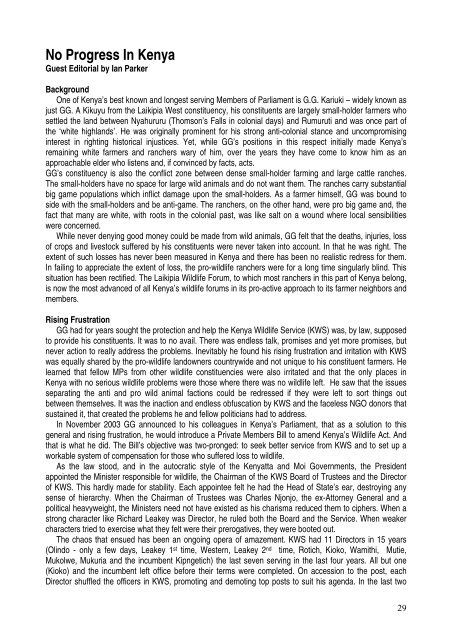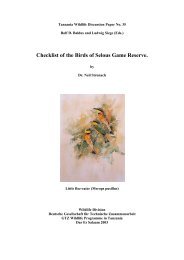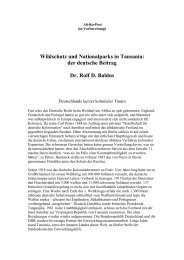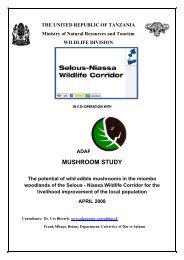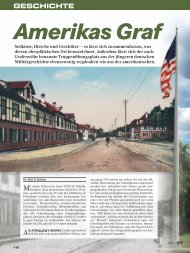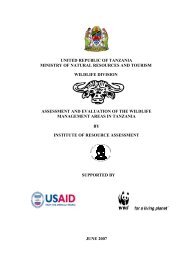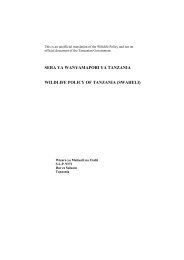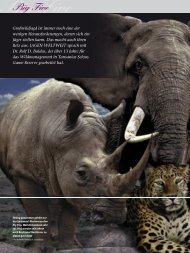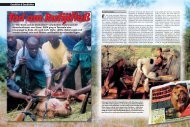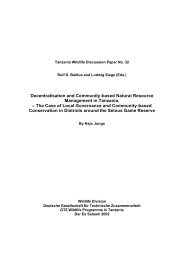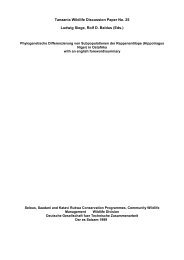African Indaba Articles - wildlife-baldus.com
African Indaba Articles - wildlife-baldus.com
African Indaba Articles - wildlife-baldus.com
Create successful ePaper yourself
Turn your PDF publications into a flip-book with our unique Google optimized e-Paper software.
No Progress In KenyaGuest Editorial by Ian ParkerBackgroundOne of Kenya’s best known and longest serving Members of Parliament is G.G. Kariuki – widely known asjust GG. A Kikuyu from the Laikipia West constituency, his constituents are largely small-holder farmers whosettled the land between Nyahururu (Thomson’s Falls in colonial days) and Rumuruti and was once part ofthe ‘white highlands’. He was originally prominent for his strong anti-colonial stance and un<strong>com</strong>promisinginterest in righting historical injustices. Yet, while GG’s positions in this respect initially made Kenya’sremaining white farmers and ranchers wary of him, over the years they have <strong>com</strong>e to know him as anapproachable elder who listens and, if convinced by facts, acts.GG’s constituency is also the conflict zone between dense small-holder farming and large cattle ranches.The small-holders have no space for large wild animals and do not want them. The ranches carry substantialbig game populations which inflict damage upon the small-holders. As a farmer himself, GG was bound toside with the small-holders and be anti-game. The ranchers, on the other hand, were pro big game and, thefact that many are white, with roots in the colonial past, was like salt on a wound where local sensibilitieswere concerned.While never denying good money could be made from wild animals, GG felt that the deaths, injuries, lossof crops and livestock suffered by his constituents were never taken into account. In that he was right. Theextent of such losses has never been measured in Kenya and there has been no realistic redress for them.In failing to appreciate the extent of loss, the pro-<strong>wildlife</strong> ranchers were for a long time singularly blind. Thissituation has been rectified. The Laikipia Wildlife Forum, to which most ranchers in this part of Kenya belong,is now the most advanced of all Kenya’s <strong>wildlife</strong> forums in its pro-active approach to its farmer neighbors andmembers.Rising FrustrationGG had for years sought the protection and help the Kenya Wildlife Service (KWS) was, by law, supposedto provide his constituents. It was to no avail. There was endless talk, promises and yet more promises, butnever action to really address the problems. Inevitably he found his rising frustration and irritation with KWSwas equally shared by the pro-<strong>wildlife</strong> landowners countrywide and not unique to his constituent farmers. Helearned that fellow MPs from other <strong>wildlife</strong> constituencies were also irritated and that the only places inKenya with no serious <strong>wildlife</strong> problems were those where there was no <strong>wildlife</strong> left. He saw that the issuesseparating the anti and pro wild animal factions could be redressed if they were left to sort things outbetween themselves. It was the inaction and endless obfuscation by KWS and the faceless NGO donors thatsustained it, that created the problems he and fellow politicians had to address.In November 2003 GG announced to his colleagues in Kenya’s Parliament, that as a solution to thisgeneral and rising frustration, he would introduce a Private Members Bill to amend Kenya’s Wildlife Act. Andthat is what he did. The Bill’s objective was two-pronged: to seek better service from KWS and to set up aworkable system of <strong>com</strong>pensation for those who suffered loss to <strong>wildlife</strong>.As the law stood, and in the autocratic style of the Kenyatta and Moi Governments, the Presidentappointed the Minister responsible for <strong>wildlife</strong>, the Chairman of the KWS Board of Trustees and the Directorof KWS. This hardly made for stability. Each appointee felt he had the Head of State’s ear, destroying anysense of hierarchy. When the Chairman of Trustees was Charles Njonjo, the ex-Attorney General and apolitical heavyweight, the Ministers need not have existed as his charisma reduced them to ciphers. When astrong character like Richard Leakey was Director, he ruled both the Board and the Service. When weakercharacters tried to exercise what they felt were their prerogatives, they were booted out.The chaos that ensued has been an ongoing opera of amazement. KWS had 11 Directors in 15 years(Olindo - only a few days, Leakey 1 st time, Western, Leakey 2 nd time, Rotich, Kioko, Wamithi, Mutie,Mukolwe, Mukuria and the incumbent Kipngetich) the last seven serving in the last four years. All but one(Kioko) and the incumbent left office before their terms were <strong>com</strong>pleted. On accession to the post, eachDirector shuffled the officers in KWS, promoting and demoting top posts to suit his agenda. In the last two29


